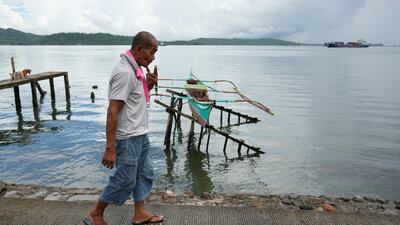For the past two weeks, the popular tourism destination of Sharm El Sheikh has been notably less relaxed than usual, particularly in the past 24 hours. The site was abuzz as delegates scrambled to get a deal at the Cop27 UN climate summit.
Getting such agreements to protect the planet could hardly be more important. Speaking at the event on Friday, US President Joe Biden said: “The climate crisis is about human security, economic security, environmental security, national security and the very life of the planet.”
Despite today's sobering outlook for the environment, there have been many positive moments, developments and stories from this year's meeting, and Egypt can be proud of hosting a productive summit.
New ideas are being explored. Activists called for a “Paris Agreement for nature” to prevent land degradation and biodiversity loss. On Tuesday, The National wrote about the compelling testimony of Revan Ahmed, 12, who spoke about the role of children in calling for action to deal with climate change. She was the youngest member of a Unicef delegation, representing an age group whose voice is little heard, even though it stands to lose the most. “My favourite season is spring,” Revan told The National. “I love seeing green everywhere. Recently, spring has changed, it’s yellow. Everything is becoming yellow and the weather is becoming drier and drier. This made me ask myself, why?”
And there have been interesting discussions. A particularly timely one focused on who should pay for damage caused by climate change, in light of terrible flooding that hit Pakistan recently. It killed more than 1,700 people and displaced 2 million. Repairing the damage is estimated to cost $30 billion. Some activists argue that the few rich countries most responsible for historic carbon emissions should pay reparations to states such as Pakistan, which are responsible for far fewer emissions.
Nonetheless, there was also uncertainty. As events came to a head in Sharm El Sheikh, Wael Aboulmagd, the special representative of the summit's Egyptian presidency, said: "I think we have a larger than normal number of lingering issues."
It has often hard to drum up sufficient attention and consensus on the climate issue. After all, it is still considered a long-term one, and short-term crises pose a constant distraction. This year's meeting comes at a particularly crowded time. At present, world leaders are at the G20 meeting, as they try to use diplomacy to manage existing conflicts, prevent new ones and help a struggling global economy.
They must remember that solving the climate issue goes hand in hand with protecting global security and prosperity. As western countries look for solutions to new crises – whether it be vast numbers of economic migrants and refugees trying to get to Europe, instability in the Sahel or failed harvests – they must remember that environmental factors are central.
Climate diplomacy of all kinds might get less of the limelight in testing times, but missing the opportunities it creates is a mistake. As with all Cop meetings, tangible progress at Cop27 has been a mixed bag and it remains to be seen how much will change.
But in terms of raising important topics and awareness, it has been a major success for Egypt and the Middle East. That momentum is here to stay, as the UAE prepares to host Cop28 next year.


